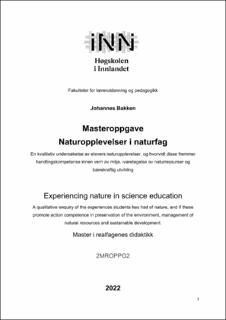| dc.contributor.advisor | | |
| dc.contributor.author | Bakken, Johannes | |
| dc.date.accessioned | 2022-09-20T16:11:21Z | |
| dc.date.available | 2022-09-20T16:11:21Z | |
| dc.date.issued | 2022 | |
| dc.identifier | no.inn:inspera:111518709:72595099 | |
| dc.identifier.uri | https://hdl.handle.net/11250/3019344 | |
| dc.description.abstract | Naturfagundervisningen i den norske grunnskolen har historisk hatt som et mål å fremme en vilje og evne til å bidra til vern av natur og ressurser. I nyere tid har dette blitt utviklet til å inkludere å bidra til en bærekraftig utvikling (BU). I den siste læreplanen fortelles det at dette skal oppnås gjennom økt kunnskap og naturopplevelser (Kunnskapsdepartementet, 2020c).
Naturopplevelser har vist seg å være virkningsfulle i å fremme et varig engasjement for miljøet (Chawla, 2020). De kan derfor være et viktig didaktisk virkemiddel innen utdanning for bærekraftig utvikling (UBU) og miljøundervisning (EE), samt å fremme handlingskompetansen til ungdom innen spørsmål om miljø og bærekraft. I denne masteroppgaven har jeg undersøkt hva som kjennetegner naturopplevelser tre målrettede rekrutterte elever oppgir å ha fått gjennom ti år med undervisning. Videre vil jeg undersøke om disse opplevelsene kan ha bidratt til en økt handlingskompetanse innen vern av miljøet og å bidra til en bærekraftig utvikling.
I denne oppgaven kategoriseres naturopplevelser som enten direkte, indirekte eller symbolske, ut fra beskrivelsen til Kellert (2002).
Metoden som er benyttet i denne undersøkelsen er kvalitativ.
Respondenter til studien ble rekruttert ved hjelp av spørreundersøkelse først brukt i Sverige av Olsson, Gericke og Chang Rundgren (2016). 24 elever gjennomførte undersøkelsen, og fra disse ble det rekruttert tre respondenter til å delta i intervjuer. Resultatene fra disse danner grunnlaget for den videre analysen og diskusjonen.
Fra intervjuene ble samtlige kategorier av naturopplevelser identifisert. Spesielt var de symbolske naturopplevelsene representert i naturfagundervisning. Direkte og indirekte naturopplevelser var vanligst på fritiden eller i valgfaget natur og miljø. Elevene mente også selv at naturopplevelsene hadde bidratt til en økt handlingskompetanse, selv om ingen av de anså seg selv som spesielt opptatt av spørsmål om vern av miljøet eller bærekraftig utvikling.
Nøkkelord: Naturopplevelser, utdanning for bærekraftig utvikling (UBU), miljøundervisning (EE), handlingskompetanse | |
| dc.description.abstract | The natural sciences subject in the Norwegian primary and lower secondary school has had an historical focus of promoting the will and ability to preserve the natural environment. In more recent times this has been expanded to also include sustainable development (BU). From the most recent curriculum is says that this shall be achieved with increased knowledge and experiences in natural environments (Kunnskapsdepartementet, 2020c).
Experiences in natural environments has been shown to effective in promoting a lasting commitment for the preservation of the environment (Chawla, 2020). Because of this, they can be an important didactical tool for the education for sustainable development (UBU), environmental education (EE), and to promote action competence in youths when it comes to questions about the environment and sustainability. For this master’s thesis, I have explored what characterizes the experiences from nature a set of specifically recruited students has had during their 10 years of education. I will also explore if these experiences has had an effect on their action competence when it comes to the preservation of the environment and help reach the goals of sustainable development.
Kellert (2002) three categories of natural experiences has been used to describe the experiences of my informers. There as direct, indirect, and symbolic experiences.
The method used in this master’s thesis is qualitative.
The respondents to the study was recruited with the help of a questioner first used in Sweden by Olsson et al. (2016). 24 students completed the questioner, and from these there was recruited three respondents to take part in interviews. The results from these interviews form the basis for the subsequent analysis and discussion.
All three of the categories could be identified from the interviews. The symbolic experiences were especially prevalent in the natural sciences education. The direct and indirect natural environment experiences were more common on the respondent’s free time, and from the elective subject natur og miljø (nature and the environment). The students also thought that the experiences had a positive effect on an increased action competence, even though none of them self-identified as environmental activists.
Keywords: Experiences in the natural environment, education for sustainable development (UBU), environmental education (EE), action competence. | |
| dc.language | nob | |
| dc.publisher | Inland Norway University | |
| dc.title | Naturopplevelser i naturfag -
En kvalitativ undersøkelse av elevers naturopplevelser, og hvorvidt disse fremmer handlingskompetanse innen vern av miljø, ivaretagelse av naturressurser og bærekraftig utvikling | |
| dc.type | Master thesis | |
